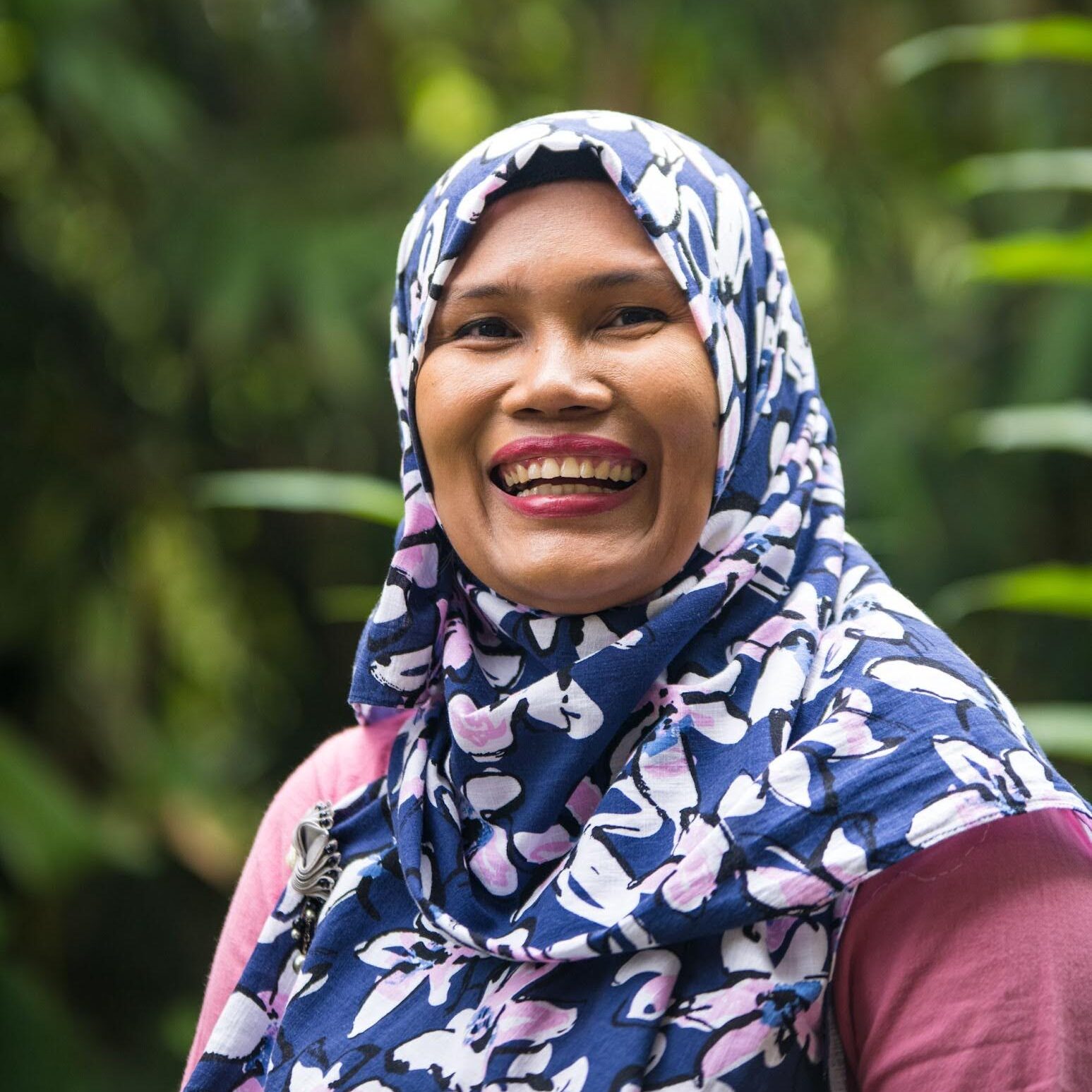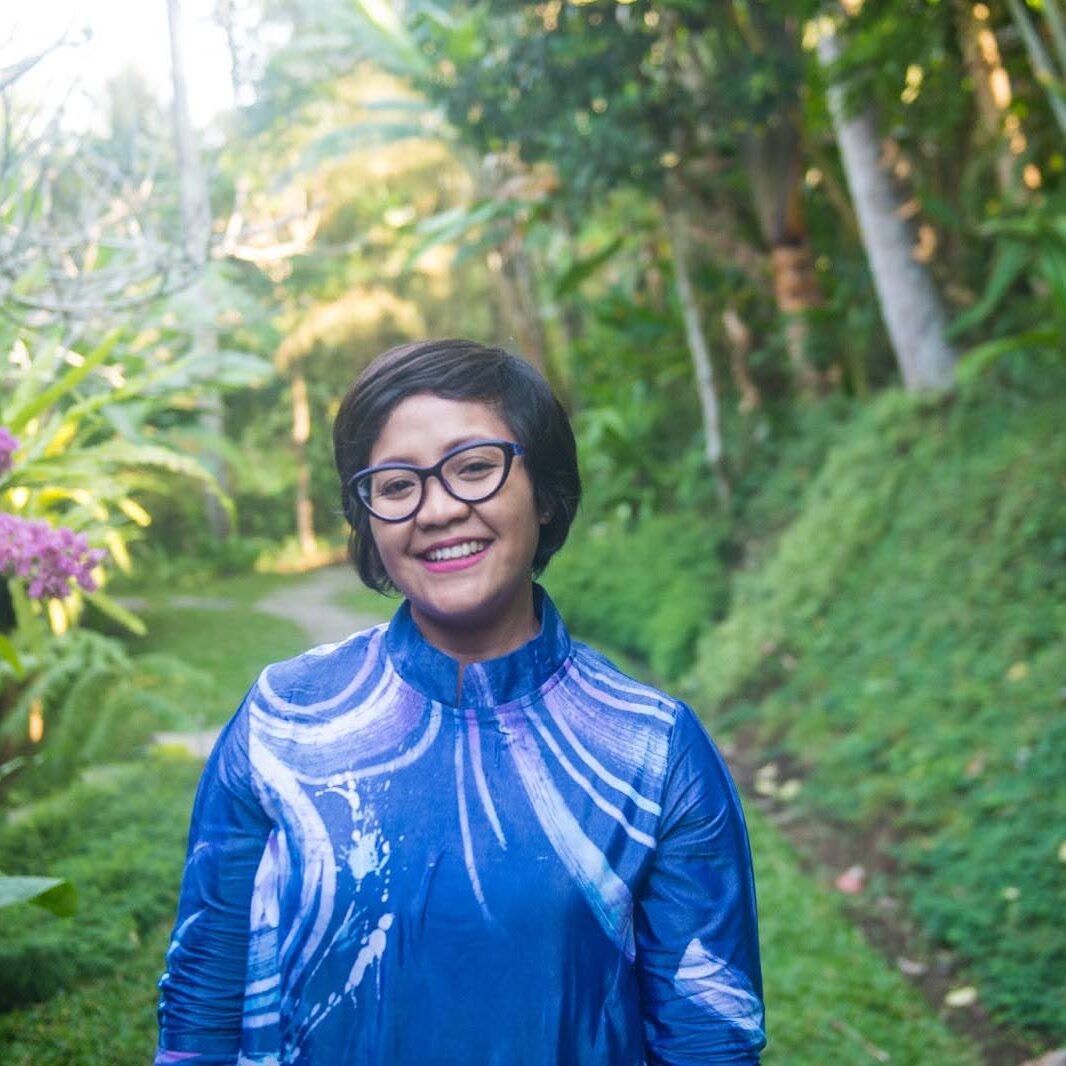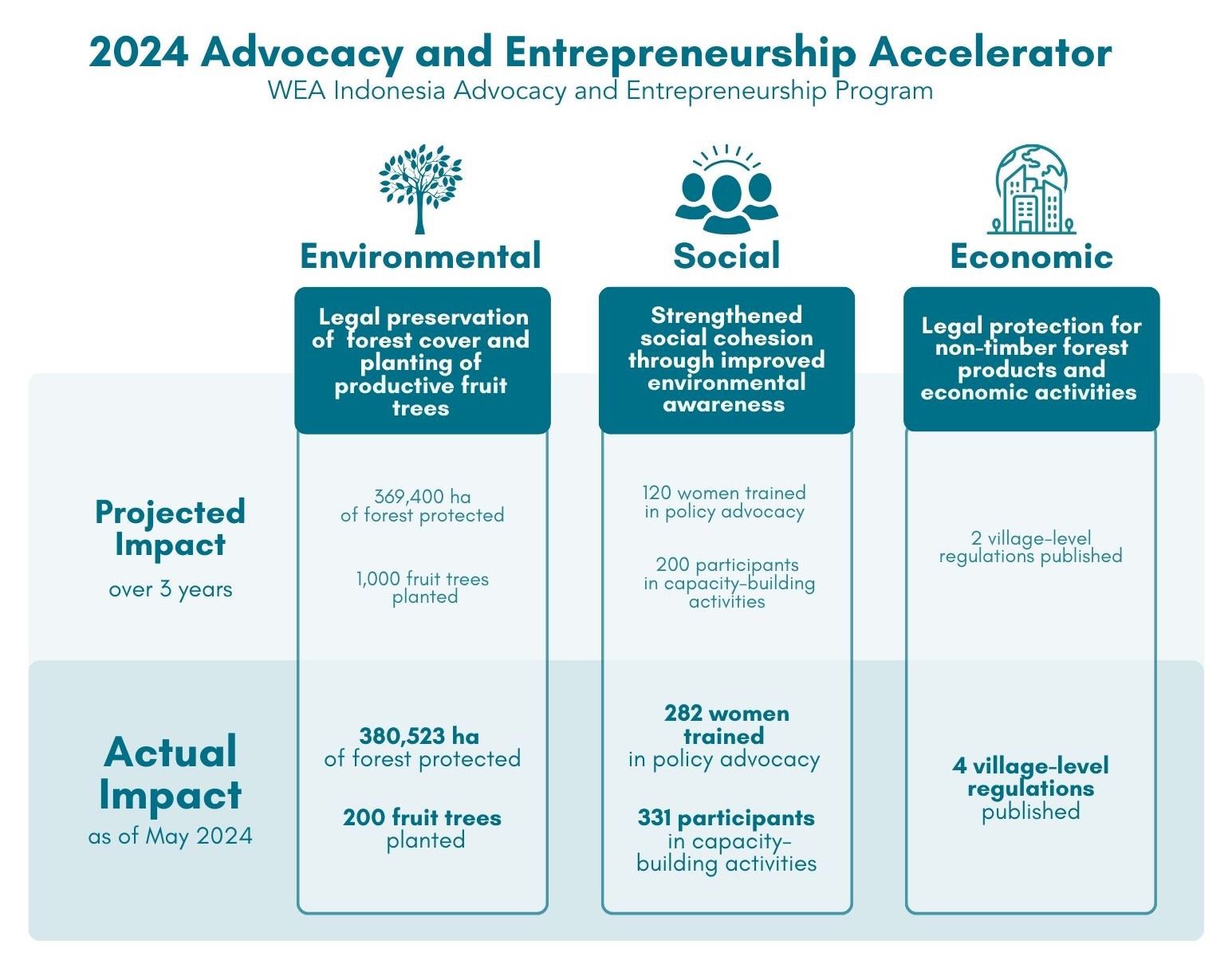Women of Leuser: Transforming Economies and Defending Indonesia’s Last Wild Spaces
by Hannah Adams, WEA Global Program Manager
In the heart of Indonesia's Leuser Ecosystem, Indigenous women are taking action to defend and conserve their ancestral lands and lifeways.

The Leuser Ecosystem (pronounced "low-sir") is the last place on Earth where Sumatran orangutans, tigers, rhinos, and elephants continue to coexist and roam freely. The only remaining habitat large enough to sustain viable populations, this biodiversity hotspot spans over 2.6 million hectares. It covers nine major river systems, two volcanoes, and a mosaic of habitats that sequester billions of tons of carbon and offer essential ecosystem services for four million people. Like many of the world’s most important ecosystems, this precious region is threatened by powerful extractive industries, including logging, palm oil, and other mono-crop farming and production. Ancient water sources are drying up due to climate change and deforestation, not only threatening the natural functions of the ecosystem but also disrupting the lives of those who rely on its resources.
For the Indigenous communities of Aceh in Sumatra, Leuser is more than just a home; it is a living repository of cultural heritage and traditional knowledge passed down through generations. The intricate relationship between these communities and their environment forms the backbone of their cultural identity. For the Acehnese, protecting the Leuser Ecosystem is intrinsically linked to safeguarding their rights and preserving their traditional lifeways.
In partnership with the Katahati Institute, WEA is implementing and scaling community-driven solutions to protect the Leuser Ecosystem through the Indonesia Advocacy and Entrepreneurship Program. The program builds the capacity of local women leaders and women-led groups at the intersection of human rights, economic livelihoods, environmental resilience, and movement-building in order to prevent ecological destruction and create healthier, more climate-resilient communities in Leuser.

The Women of Aceh
As the caregivers of their communities, the women of Aceh are best positioned to generate lasting and transformative change for the villages and habitats of Leuser through strategies like economic development. However, they face significant structural and social barriers that hinder their access to formal education and more lucrative economic opportunities. Aceh is a conservative province and the only region in the world's most populous Muslim country enforcing an interpretation of Shariah law that often excludes women from decision-making. This has meant restrictions on the ability of women in Aceh to protect the forest as entrepreneurs, as well as their right to use their forest backyards for their livelihoods. To fill this gap, Indigenous women leaders across Indonesia are taking action to advance solutions that center Acehnese women, protecting the environment and supporting communities.
The Power of Alliance Building
Two of those leaders are Raihal Fajri and Leoni Rahmawati, who first met as participants of WEA’s inaugural Indonesia Grassroots Accelerator in 2019. Raihal is the Executive Director of the Katahati Institute and has emerged from Aceh as a powerful advocate for Indigenous women’s rights and environmental conservation. At the time, Raihal had grown a successful movement to block extractive mining in Aceh and came to WEA with a vision to help more women from her community find their voice.
Motivated by witnessing the struggles women in Aceh face firsthand, Raihal Fajri has been creating pathways for women to come together, achieve financial independence, and foster environmental stewardship. She emphasizes the importance of women as knowledge-keepers and the need for policies that protect both their rights and the environment.
"If they don't have the access due to the cultural boundaries, we help the women bring the power to negotiate in policy and speak on a policy level." - Raihal

Raihal used her time in the 2019 Accelerator to design climate resiliency leadership programs and spent the next three years growing a movement of women’s groups in the Leuser region. In 2023, Raihal joined WEA’s Rural Climate Entrepreneurship Program as a facilitator and mobilized three established women's groups to launch six eco-enterprises that produce high-quality, non-timber forest products, such as palm sugar and wild cassava goods. This expanded WEA’s programming in Indonesia to include ongoing mentorship for these eco-enterprises in production, branding, marketing, and business management.


Recognizing the urgent need to advocate for conservation laws that protect the rights of women eco-entrepreneurs to gather and market forest resources, Raihal reached out to Leoni, her fellow 2019 Accelerator alumna, for her expertise in campaign-building. Co-founder of Hutan Itu Indonesia, Leoni came to the 2019 Accelerator with years of experience in movement-building in Aceh. Today, her work focuses on sharing skills and resources with women in rural areas who often lack access to education and economic opportunities. In partnership with WEA, Raihal and Leoni designed and are currently implementing the WEA 2024 Advocacy and Entrepreneurship Accelerator, bringing to life their mutual vision to create lasting transformation for women and the environment in Aceh.

Growing up in Jakarta, a modern city in close proximity to rural communities, Leoni Rahmawati developed her passion for social justice and bridging the opportunity gap between urban and rural women. Leoni believes in a comprehensive approach to women’s empowerment that includes capacity building, resource sharing, and advocacy as a means to create lasting, systemic change.
“Empowering women in rural areas is not just about providing resources; it’s about ensuring they have the confidence to use those resources to create lasting change.” - Leoni
The 2024 Advocacy and Entrepreneurship Accelerator
In January 2024, Raihal and Leoni partnered with WEA to empower the leadership of women from 12 villages in Aceh to effectively advocate for the legalization of non-timber forest products and the advancement of Indigenous land rights. The 2024 Advocacy and Entrepreneurship Accelerator weaves together social, economic, and environmental resilience with movement-building and leadership training, growing the capacity and amplifying the advocacy of Indigenous women eco-entrepreneurs. Through improved policies, this Accelerator is poised to impact up to 400,000 people — including 190,000 women and girls.

The Accelerator began with a community mapping phase to understand the interests, motivations, challenges, and strategies of the communities in Aceh when it comes to accessing and utilizing forest resources. Input was gathered from stakeholders — Katahati-supported women’s groups, community leaders, and youth populations — and the results made clear the capacity needed for families and forest village communities in Leuser to be able to effectively advocate for the safe and sustainable use of forest resources for their economic development.
In the second phase of the Accelerator, participants were trained in sustainable entrepreneurship, campaigning, and policy proposal drafting - through peer learning and horizontal knowledge exchange. Central to this initiative is alliance-building and bringing together diverse stakeholders to create a robust network of support and information that is vital for the responsible and sustainable management of critical ecosystems. This collaborative learning environment ensured that these women leaders were well-equipped to lead advocacy efforts and engage effectively with regional governments to make a case for conservation policy that prioritizes women's participation, protects their rights, and amplifies their impact across the region. The women then launched a coordinated advocacy campaign led by Katahati that leveraged the skills gained and networks built during the program. Women’s groups continue to hold public hearings with local governments where they present drafted proposals for improved district-level policies.


By May 2024, 15 groups - registered businesses and nonprofits, community-based organizations, and informal women’s groups - had been involved in different aspects of the Accelerator, creating a robust network of support and information that is strengthening the social cohesion between the 12 participating villages. The program also included training and development for three new non-timber forest products to market, including pineapple fiber textiles. Women in the program have shared their knowledge with other women and girls in their communities, creating a ripple effect of capacity building.



Good Things to Come
Over the next three years, WEA and Katahati will continue to expand the alliance of women leaders in Indonesia, enhancing environmental resilience and driving broader benefits for the Indigenous communities of the Leuser Ecosystem. This vision includes co-creating climate resiliency centers to serve as hubs for ongoing training and resources, and expanding reforestation efforts through supporting new women-led eco-enterprises producing non-timber forest products. In the short term, WEA continues to focus on capacity building, identifying new market entry points, and enhancing the equipment and workspaces of women-led eco-enterprises in Aceh.
WEA’s Indonesia Advocacy and Entrepreneurship Program exemplifies our strategy of bringing solutionary women together to create scalable models that support leaders and protect critical ecosystems. In Aceh, empowering the leadership of grassroots women is creating a ripple effect that is leading to a healthier ecosystem, stronger local economies, and more resilient communities. By standing in solidarity with Indigenous women leaders and protecting the Leuser Ecosystem, together, we are creating a future where women and the planet thrive.
Are you interested in learning more about WEA’s expansive work in Indonesia? Click here.
